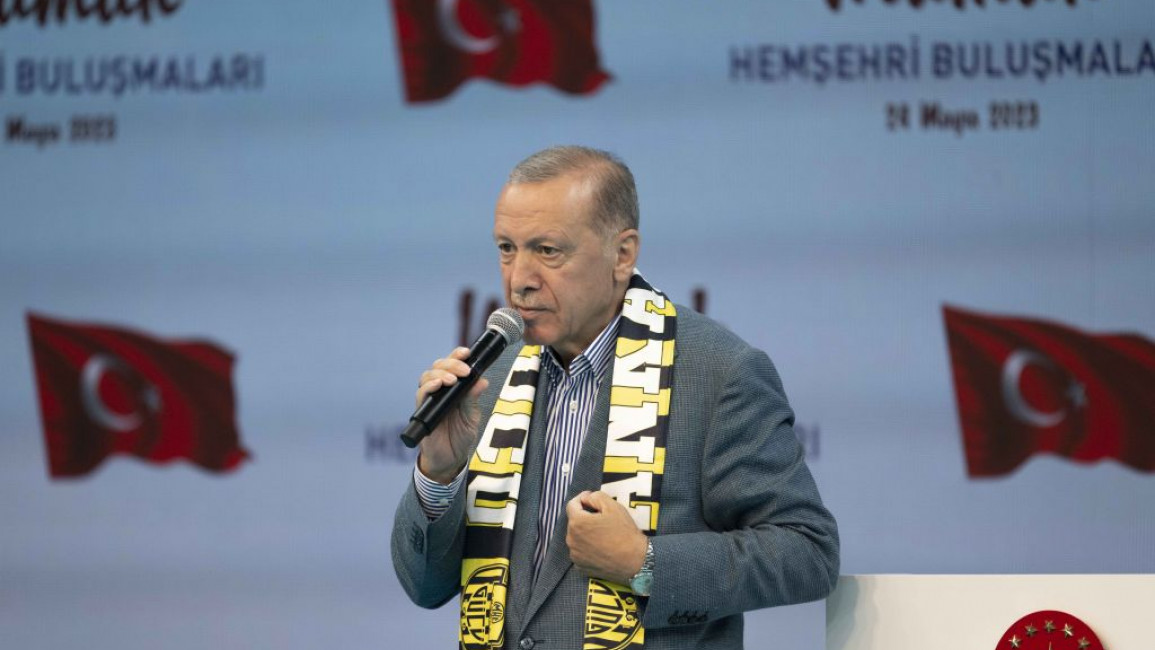Erdogan's AK Party split on economic plan as Turkey runoff looms, sources say
Days before Turkey's runoff presidential election, there is disagreement and uncertainty within Recep Tayyip Erdogan's government over whether to stick with what some call an unsustainable economic programme or to abandon it, insiders say.
According to interviews with nine sources, either government officials or others with direct knowledge of the matter, an informal group of ruling-party members have gathered in recent weeks to discuss how it might adopt a new policy of gradual interest rate hikes and a targeted lending programme.
Erdogan is not directly involved in the talks, which include some AK Party members who are outside the administration but held senior positions in the past, four of the sources said, requesting anonymity to discuss the private meetings.
On the other side are officials and cabinet members who publicly state they want to stick with the current programme of boosting exports and economic growth via rate cuts and heavily managed forex, credit and debt markets.
Given Erdogan led after the initial vote, much is at stake for the major emerging market economy that has been gripped by a cost-of-living crisis and series of currency crashes.
With foreign reserves tumbling, some analysts say Turkey could face another economic crash as soon as this year that sends inflation soaring again and strains its balance of payments – unless the government changes course.
"They are studying a new economic model… since the existing model cannot be sustained," said a senior official close to the matter.
"Basically, it would gradually raise the interest rate and end the structure of using multiple rates."
The group has not yet presented the full plan to Erdogan, the official said.
Erdogan's office was not immediately available for a comment.
Seeking to extend his reign into a third decade in the Sunday runoff, Erdogan has said in the campaign that interest rates would decrease as long as he is in power, and inflation would be brought under control.
All sources said there is no suggestion Erdogan has made a decision and most said he has previously heard the concerns over growing economic strains and depleted foreign reserves.
Three of the sources said he could stay the course for the next several months at least, emboldened by a better-than-expected result on 14 May when he took 49.5 percent of the first-round vote versus his challenger Kemal Kilicdaroglu at 44.9 percent.
Analysts say the president is in pole position to win the runoff.
"There are two different opinions within the party," another source, a ruling AK Party official, said.
He added that any decision would seek to preserve economic stability through to the next critical election test: municipal polls in March next year.
A third official said the strong election results could ultimately convince leaders "that a rapid change is not needed".
Pivot possibility
The lira has shed almost 80 percent of it value to the dollar in five years largely due to Erdogan's economic policies, economists say.
It has touched new record lows since the initial vote while measures of investment risk have soared.
Kilicdaroglu's opposition alliance pledges to reverse Erdogan's programme with aggressive rake hikes and a return to free-market principles, a prospect that cheered international investors ahead of the elections.
Though a self-proclaimed "enemy" of interest rates, Erdogan has on occasion taken a more orthodox approach when faced with past economic crises, before pivoting back.
The informal group working on a new plan is not considering aggressive monetary tightening, but rather a more gradual path that again emphasises the policy rate in lending markets, four of the sources said.
Another option is using a public institution and state subsidies to deliver selective credit, they added.
Several ideas were considered, the details of which were unclear. It was also unclear whether the group had pitched the plan to Erdogan, or his level of interest in it.
Fitch said Turkey's "B negative" credit rating depends on whether the post-election policy "becomes more credible and consistent" given the pressure on the lira, wide current account deficit, declining reserves and high inflation.
'Very bleak outlook'
The president appointed a new economy minister and central bank governor in 2021 to begin slashing interest rates to 8.5 percent from 19 percent at the time.
This sparked a historic currency crash in late 2021 and sent inflation above 85 percent last year, prompting more than 100 new regulations that discouraged foreign currency holdings and ramped up banks' bond holdings.
The central bank's policy of stabilising the lira, meanwhile, sent its net foreign reserves into negative territory for the first time since 2002, while the bank has also sold $9 billion in gold since March to meet pre-election demand.
Authorities could seek more FX from foreign allies, or further suppress demand which could slow growth and risks clamping down further on capital, economists say.
"It all points to a very bleak outlook. It's hard to believe that this can be sustained," said Francesc Balcells, CIO of emerging markets debt at FIM Partners.
"You could argue [Erdogan] could have a change of heart and then embrace orthodoxy," he said.
"I'm not ruling it out… But at the end of the day, I think the basis of his economic beliefs will not change."
Ahead of the elections, Erdogan hinted at a possible change when he said former Finance Minister Mehmet Simsek, who is well know by international investors, could return to government to help shape policies.
But it remained unclear what if any role Simsek might play if Erdogan wins the runoff, the interviews showed.
Officials who want to stick with the current programme say its selective loan policies prioritising technology, energy, natural resources and tourism are estimated to contribute cumulatively some $289 billion to the current account balance by 2030, thus supporting the currency.
(Reuters)



